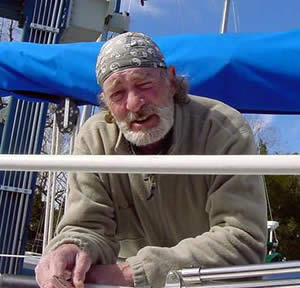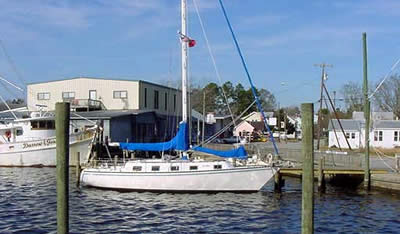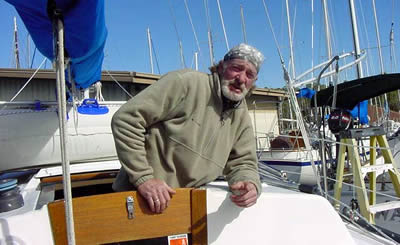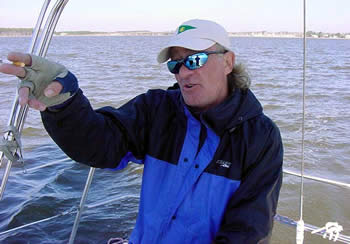
Lots
of boats come to Oriental, some tie up at the Town Dock for
a night or two, others drop anchor in the harbor for a while.
If you've spent any time on the water you know that every boat
has a story. The Shipping News on TownDock.net brings you the
stories of the boats that have visited recently.
Wednesday, March 17, 2004
Phil Leaves. Again.
A Hunter 37 left Beaufort last week, destination England. That may not strike many people as news. But here in Oriental this event was newsworthy because it’s now been almost a whole week and the boat and its captain, Phillip Hay-Jahans have not come back to NC.
We first met Phil one morning in February after overhearing his British accent while he was getting coffee at The Bean. Word had been going around Oriental that a British sailor was having a hard time getting away.

Phil Hay-Jahans |
“Are you the sailor who keeps trying to leave?” Phil Hay-Jahans smiled. That was surprising. A full-face grimace would’ve been in order given the run of bad luck Phil had had since December.
First, The Business Plan
Phil’s story starts with his business plan. He figured a relatively spacious US boat, one with headroom, head AND separate shower– amenities not widely common on British boats – could sell for a good profit back home in England.
So he decided he’d buy a boat in the US, sail it to St. Martin in the British Virgin Islands, work on it during the winter months and then sail it in the early spring to Solcombe, Devon on England’s south shore. (Phil had to be back there well before summer when his job as boat master resumed at a Solcombe sailing school.) In England, he’d finish work on the boat, live on it for a while and then sell it at a profit.
With this game plan in mind, Phil flew to the US in early December. In Oriental he bought a Hunter 37 named “Panasea”.

The Hunter 37 at the Town Dock. |
He thought he’d leave right away in December, but on his first night on the boat, he found that the port lights leaked.
As he explains, “I’d looked at the boat on a sunny day.” Now the proud owner, he says “I found leaks all over the place.”
Those leaks had to be fixed and so Phil delayed his departure. He worked on the boat at the SailCraft boatyard. He celebrated Spirit of Christmas in Oriental. Two and a half weeks later, he celebrated the running of the dragon and New Years in Oriental.
In early January he was set to go. But it appeared Oriental wasn't set to let him go.
First, it was the winds. Phil was tied up at the Town Dock, planning to leave with a couple on another boat who were famliar with the channel down to Beaufort. They would lead the way for Phil on his first trip on any part of the ICW.
A witness watching from The Bean says the other boat pulled away. Phil tried to do the same but found his 5'1" keel was aground, thanks to the wind tide that can drop the water level without much warning. The other couple could be seen clrcling in the harbor for about a half hour. A fishing boat tried to pull "Panacea" off the harborbottom but she wouldn't budge. Phil had to wait another day for higher water to float his boat and let him down the ICW to Beaufort.
And then he was there. Finally, finally in Beaufort. And the Beaufort Inlet, the opening to the Atlantic and St. Martin. Progress was being made.
But then, in the Inlet he found that the autopilot was presenting a new challenge.
It “would only turn to port.” Phil says, “It was just doing a circle.”
He would need a new autopilot. So he turned back. But not to Beaufort. Instead, he manually steered "Panasea" back up the ICW to Oriental, “because SailCraft was the only address I knew” in the US.
Phil tied up at the Town Dock – and says he received a warm greeting at the Bean. (The Bean's manager Susan Conley reports Phil was looking a bit 'sheepish' .)
A week later he had the new Autohelm and was ready to go.
“We are now,” Phil says, for those keeping score, “in mid-January”.
Phil took off down the ICW to Beaufort one more time. He didn't head out in to the Atlantic right away because he was waiting for a better weather window.
It was while he was waiting that he steered "Panasea" to a Beaufort fuel dock. On the way to the fuel dock, the boat's prop got fouled on a rogue piece of line hanging from a mooring. A diver worked it free.
But still, all seemed well. Especially when the weather window came and Phil and “Panasea” headed out through it on to the Beaufort Inlet and the Atlantic, destination: St. Martin.
Then, about four miles in to the Atlantic, an alarm went off. His engine had died.
Phil hoisted all the sails on the Hunter cutter, only to find that the wind had died, too. He was at the mercy of the tide and it was mercilessly pushing him toward Cape Lookout.
And no one was answering his radio.
In desperation, he waved his arms at a passing boat, flagging it down. It was a military vessel, but the Marines on board who were returning from a training mission couldn’t help.
A SeaTow boat arrived. Some bargaining ensued on the ocean waters. The asking price. Phil says, would have gobbled up most of the 200 pounds in British currency he needed in the BVI. The SeaTow captain decided to treat the tow as a training session for a new crewmember. (Of the Sea Tow captain, Phil says “many thanks for the kindness.”) Phil was towed in to Beaufort.
But as before, Phil didn’t stay in Beaufort long. Despite the lack of engine, he once more headed for Oriental. He waited for a westerly breeze to sail up Adams Creek. That sail to Oriental took 6 hours.
And again he was back at the SailCraft Boat Yard. There he discovered that the shaft to the prop had bent, most likely when the prop got fouled. He needed a new shaft and a new strut.

At Sailcraft Services boat yard. |
This was in mid-late January and though Phil lavishes praise on town for the people and helpfulness he found there, Oriental was a sharp contrast to the tropical island weather he hoped to be enjoying by then. In fact, ice storms and cold weather were hitting Oriental hard.
Phil says he got through one particularly frigid spell by hunkering down below on his boat for a few days. “I made a tent out of the duvet, drank coffee, and read by the light of a ‘torch.’” (flashlight). The books, he says, “took me away from where I was.”
That may be a testimonial for the psychological benefit of reading; considering all the wear and tear he’d gone through in trying to get his boat out of NC and to the ocean, Phil seemed remarkably unfazed by it all. The tribulations of the Beaufort Inlet – twice over – might have drowned many a sailor in a pool of self-pity.
But Phil saw it as, as he put it, “a great laugh”.
Now, it was at about this point in telling his story, that Phil revealed that this was in fact, the second boat he’d tried to take across the ocean to sell for profit in England.
“Oh?”
“But if I told you that story,” Phil told us, “you’d think I was jinxed.”
We will let Shipping News readers decide.
Sail Across Atlantic For Sale, Take One
In the fall of 1999, Phil’s job at a bank in London was winding down. “I was bored with England,” he says, “so I jumped on a plane to St. Martin and went hunting for a boat.” It wasn't long before he made his way to the Soggy Dollar bar. That's where, he says, a Frenchman approached him.
“’You are looking for a boat?’”
The man had a Beneteau Oceanis 320 for sale. He named a price. Phil says he left the bar, “jumped on a computer” and found that with the exchange rate, he could sell the boat in England for double the asking price in St. Martin.
“I bought it.”
His rationale was this: “Working 8-5 in a factory, I’d be dead in 20 years.” Better, he reasoned, to buy a boat, and sail it across the ocean to make a sale; he could make more money in a shorter amount of time and have the boat as his home till he sold it.
So in early 2000, he owned the 32-foot Beneteau and looked to sail it to England. At first he had a crew. But after two days at sea, he says, his girlfriend decided that “the window was too small” for arriving in England on time. Phil then set out by himself in mid-June of 2000.
Six hundred miles in to the trip, an electrical storm hit, leaving him with no VHF, no GPS. He had, he says, only a simple compass.
After 47 days, Phil says, he was 4-5 miles off the northwest coast of France. ghosting along at 1-1/2 knots against the tide, the Beneteau going ‘goose-wing’ (aka: wing-and-wing) in the gentle breeze.
Phil was tantalizingly close to England. Home was not far.
Which is when, he says, a French boat T-boned him.
Phil says that at the time he was down below cooking dinner. Earlier, he’d noticed another boat but when it was 3/4 of a mile away, it looked as though it had changed course. “I thought they’d passed behind me.”
“Next thing I knew -- BOOM -- I’m lying over the cooker.”
“I was not happy,” Phil explains. “The weather had been beautiful and I was in the nude.”
As for the other boat, Phil says that, “All four people on board were down below having wine.”
In the collision, he says, his Beneteau sustained a vertical split two feet long. The toe rail was bent back. The hull and deck joint split for 13 feet.
The other boat, he says, continued on. He was alone, with no VHF that worked, trying to get help. Somehow, after a month and a half at sea, his cell-phone had enough battery power. He punched in 999 (the British 911 #).
Phil says he was eventually towed in to Solcombe. (Which is how he ended up as boat master at the sail training school)
As for his hopes of selling the Beneteau for a sizeable profit, Phil says the boat had not been insured, so he couldn’t recoup his investment there. The owners of the colliding boat were eventually found and Phil collected about half of what he says it cost to repair his boat. He worked on it for two years, then sold it for what he paid for it.
Nonetheless, that idea of selling an American style boat in England wouldn’t let go. And on this, his second attempt, Phil allows that the Hunter is “a bit of a gamble cos it’s unknown” in England and Europe. Still, he’s counting on its roomier accommodations to be a selling point.
First though, he has to get it there.
As for having been so long delayed in Oriental (three months by our count) Phil says, “Oriental decided on me. It’s like that.”
This had been Phil’s first time in the US. Despite the setbacks in the Beaufort Inlet, he says it’s been great.
Phil says he’s noticed regional differences. In Newark, where he first landed, he says he found a mindset of “I’ve got a life to get on with.” By comparison, “Here in Oriental, you take time,” he says almost wistfully, “And that’s a quality that’s dying in the world.”
The First Boat Trip Was Good
Phil grew up in a British family that had been in India for generations. He says he suffered from motion sickness as a kid and got airsick and carsick a lot. But when his family returned to England for good, they went by sea and he had what seemed an epiphany: “I didn’t get seasick.”
Phil took that as a sign and signed up with the British Navy. Then on the first ship he was assigned to he learned that Navy ships didn’t have the stabilizers that passenger liners did. He got seasick.
So, given his boyhood in India, we asked, were his experiences with ships and boats some kind of bad karma?
No, he laughed, just bad luck.
And a laugh.
Here’s to Phil seeing the last of the bad luck and his sense of humor holding out.

Phil underway - one last trip to Beaufort. |
Phil reportedly left from Beaufort Inlet late last week. We’ve not heard from him since, so hope that this third time has been the charm.
PS: Re: the ongoing debate over changing a boat’s name. Phil had planned to replace the name, “Panasea” with Moondance, after the Van Morrison song. He refrained from doing so before the Atlantic voyage, though the bad pun name had been scraped off the hull. While it doesn’t disprove that changing a name brings bad luck, his experience suggests that keeping a name – at least on the paperwork -- will not guarantee good luck.
Photos in the "Phil" story by Ann DeMuth
posted 3/17/2004 12:56:00 PM
|
If
you have news of a boat -- sail boat, trawler, kayak, anything that
floats -- that's come to Oriental, drop us a line here at news@towndock.net
|
|




